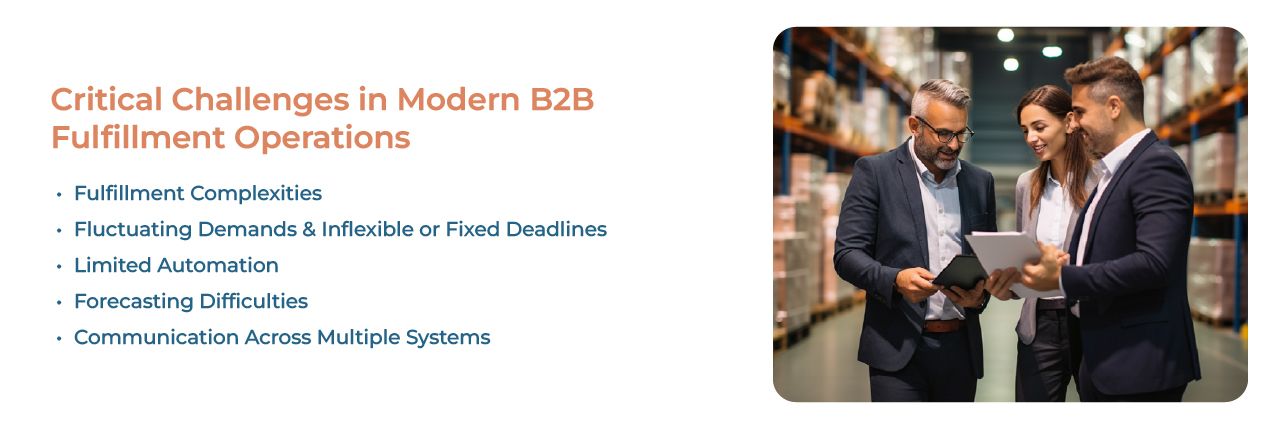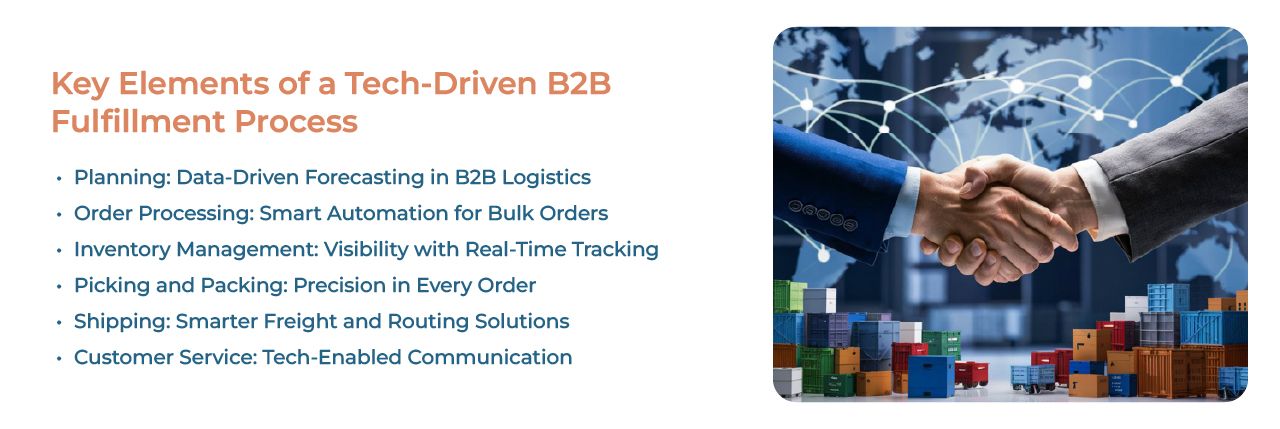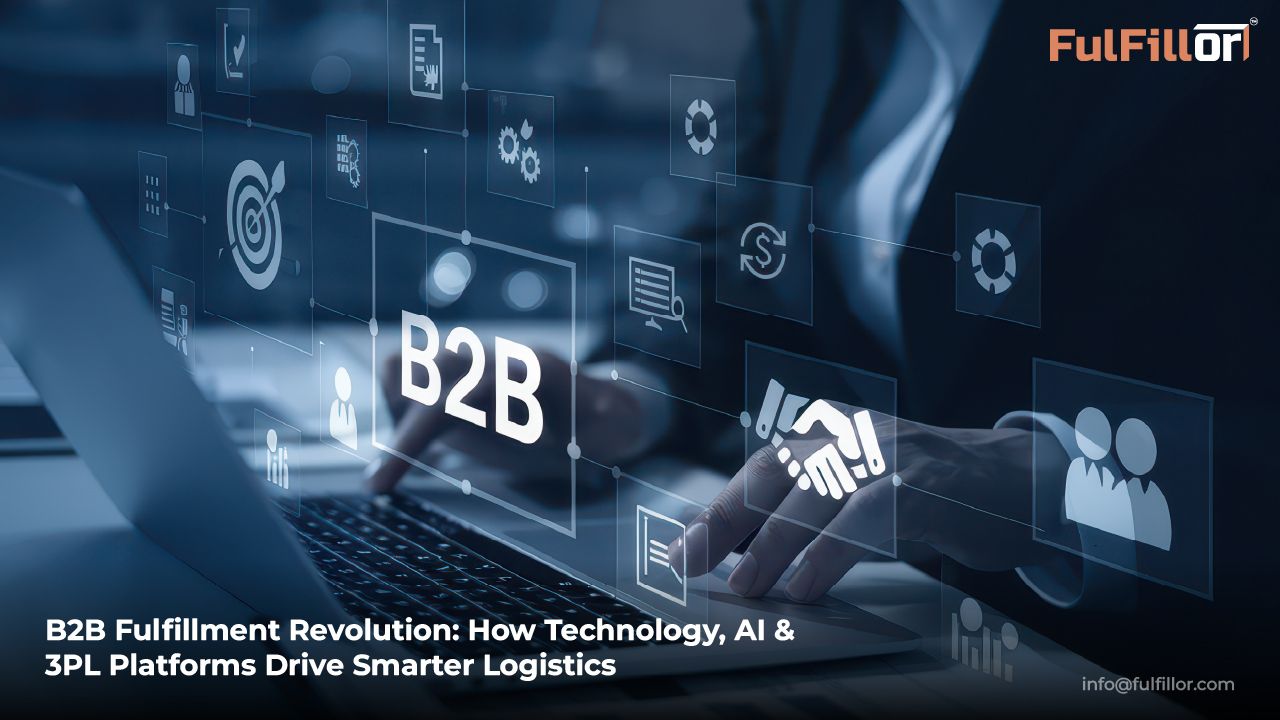B2B Fulfillment Revolution: How Technology, AI & 3PL Platforms Drive Smarter Logistics
Today, many enterprises are transforming B2B logistics operations using advanced warehouse management systems (WMS) and AI-powered logistics platforms like Fulfillor to streamline supply chains and enhance scalability. Businesses adopting AI-driven warehouse automation for B2B fulfillment gain real-time control, reduced turnaround times, and consistent delivery performance.
In 1924, the tenth millionth Model T rolled off the assembly line, a landmark achievement that showcased the strength of standardized production. A century later, Amazon is shipping over 7.7 billion ecommerce packages yearly, highlighting how automation and advanced technology in logistics are transforming B2B supply chain execution.
While B2C order fulfillment especially e-commerce, has evolved into a high-speed assembly-line model, B2B fulfillment involves more unique and complex needs such as high order volumes, intricate compliance requirements, and stringent delivery deadlines.. B2B (Business-to-Business) involves more unique and complex fulfillment needs, such as high order volumes, intricate compliance requirements, and stringent delivery deadlines.
Where D2C and B2C thrive on standardization and automation, B2B is more like building a custom-made home, complex, detail-oriented, highly specialized, and dependent on a bespoke strategy.
Private warehouses, distribution centers, and fulfillment centers need to understand the complexities of B2B order processing to meet the daunting needs in the B2B space. Moreover, meeting strict service level agreements (SLAs) of clients outsourcing their logistics functions is another challenge, especially for third-party logistics (3PL) companies.
This article discloses critical components, challenges, and best strategies for fulfillment providers catering to B2B clients. It even highlights the significance of utilizing a consulting and advanced technology Fulfillment platform like Fulfillor, which can help simplify operations and provide a competitive edge.
Key Elements, Critical Challenges, Things to Look for, Discover the Ideal Solution
B2B warehouse operations are a complicated process that involves several stages, demanding precision, coordination, and tech-driven control. Each step plays a key role in achieving successful B2B operations.

- Planning: Data-Driven Forecasting in B2B Logistics
Collaborative planning has an important role in successful B2B fulfillment. With inconsistent and unpredictable demands in B2B business, it can be challenging to meet delivery deadlines without overburdening the workforce or incurring excessive overtime costs.
While some organizations believe there isn’t enough data to forecast demands accurately, the most efficient fulfillment operations are those that proactively plan and forecast demands, leveraging data-driven forecasting, to ensure balanced capacity, resources, and customer expectations. Leveraging data-driven forecasting in supply chain management allows 3PLs to anticipate fluctuations and balance inventory more efficiently.
- Order Processing: Smart Automation for Bulk Orders
Efficient and precise order management is the backbone of B2B logistics. These transactions often involve bulk or wholesale orders, customized packing requirements, kitting, and detailed documentation. Leveraging EDI (Electronic Data Interchange) ensures seamless data exchange between systems, reducing manual effort and enabling faster, error-free order processing. Companies implementing B2B order management software with real-time tracking experience faster order validation and improved compliance across partners.
- Inventory Management: Visibility with Real-Time Tracking
From layout design to inventory control, every step of warehousing is the strong foundation of any fulfillment solution involving B2B order execution. Real-time inventory visibility is vital to avoid both stockouts and overstocking. Having robust and effective warehouse management software is essential to forecast demands, track orders, and allocate products effectively for specific customers. Smart warehouse solutions equipped with IoT and real-time tracking capabilities ensure inventory accuracy across multi-channel fulfillment networks. By integrating cloud-based 3PL platforms for logistics automation, warehouses can sync multi-client inventory and minimize human-error risk.
- Picking and Packing: Precision in Every Order
B2B orders are more complex and are often larger, making accuracy a key essential. Even a small mistake in B2B can have some serious consequences, while in B2C, it may be forgiven. B2B businesses are reliant on trading partnerships with distributors and major retailers who have high purchasing power and only want to work with the most trusted suppliers. Even small mistakes can impact customer satisfaction, long-term relationships, and substantial revenues.
- Shipping: Smarter Freight and Routing Solutions
B2B fulfillment often involves specialized shipping methods, including freight services, larger vehicles, or specialized handling, unlike typical order fulfillment processes. This means shipping costs may be less predictable or standardized. Moreover, compliance with regulations regarding labeling, packaging, and transport standards is vital. Many enterprises now depend on technology to optimize B2B inventory control and shipment accuracy, reducing costly freight delays.
- Customer Service: Tech-Enabled Communication
In B2B relationships, offering top-notch customer relationships has significant importance. Even minor supply chain issues can cause substantial business loss, making proactive and responsive customer support crucial. As customer expectations rise, digital transformation in logistics and fulfillment is becoming essential for scalable and transparent B2B relationships.
Critical Challenges in Modern B2B Fulfillment Operations

- Fulfillment Complexities: B2B fulfillment is more intricate than B2C fulfillment as it involves custom packaging, labeling, or stringent compliance.
Big Box stores and major retailers will need hang tags, their unique packaging, case labels, specific packaging or boxing with particular carrier preferences, and strict delivery windows and shipment frequency.
All of these requirements multiply and create high complexities. Clear communication and well-defined expectations with brand partners are key to successful business operations.
-
Fluctuating Demands & Inflexible or Fixed Deadlines: B2B buyers constantly face pressure from customers to deliver exceptional service at minimal cost. These customers’ profitability relies on fulfillment that is both precise and affordable. Buyers usually expect deliveries to arrive exactly on schedule. The challenge is not just meeting the Big Box store’s deadlines, but the combination of delivery deadlines and the size of orders typical of B2B customers is what makes B2B fulfillment even more difficult.
-
Limited Automation: Several B2B fulfillment operations remain largely manual, making them prone to errors and inefficiencies. Processes involving order entry, shipment planning, and invoicing are most often not fully automated, and meeting each customer’s unique inbound routing needs makes standardization and automation difficult.
The adoption of EDI and API integration for seamless B2B operations can replace repetitive tasks with automated, error-free workflows.
-
Forecasting Difficulties B2B demands are often unpredictable, making inventory and labor planning more complex. While some brand clients and fulfillment providers may see forecasting as too challenging or unnecessary, however, achieving scalability demands the ability to anticipate demands and execute accordingly to a reliable plan.
-
Communication Across Multiple Systems B2B businesses often require complex requirements, such as custom reports, multi-system integrations, which makes the whole process a lot more complicated and makes efficient execution more difficult.
The ideal solution is to have the right people in the right place with the right skills who can work as a great team together.
Things to Look for in a Modern, Technology-Driven B2B Fulfillment Solution Selecting the right fulfillment provider or solution can make or break your B2B operations.
FulFillor is an advanced fulfillment solution that connects you with advanced 3PL capabilities while aligning your operations. When evaluating a fulfillment partner or solutions, consider the following factors:
-
Scalability: Can the solution handle your business growth, especially during peak seasons or expansion into new markets? Choose a solution that can grow with your business and adjust to your changing needs, particularly during periods of rapid growth. Also, check their experience with clients of similar size and complexity, and ensure their processes and facilities are organized and equipped to handle growth efficiently. Choosing an advanced B2B fulfillment solution for enterprises ensures flexibility and resilience during demand surges.
-
Integration Capabilities: Robust integrations with your ERPs, WMS, customer portals, and other crucial business systems are essential to minimize manual data entry and ensure a smooth data and information exchange. Manual data entry or file uploads can slow operations and create errors. FulFillor supports real-time syncing of purchase orders, customer orders, inventory data, and shipping notices across systems, ensuring smooth, scalable operations. An automated 3PL fulfillment software supports end-to-end data sync and eliminates manual reconciliation delays.
-
Customization: Look for a 3PL fulfillment solution that can adjust to your unique business needs. Look at your products, you’ll need specialized service if any meet the following criteria:
- Hazmat
- Other government regulations, such as ITAR, BIS, and FDA
- UCC Labels
- Fragile or other specific handling requirements
Make sure your 3PL solution provides clear guidance, pricing, and execution plans for any specialized service your products require.
- Strong Partnership: A reliable 3PL provider will be a strategic partner in your success, offering strategic advice, process optimization, and dedicated support. Strong communication, transparency, and cultural compatibility are critical. Ensure your team has direct access to knowledgeable contacts and the tools to achieve success.
Discover the Ideal B2B Fulfillment Solution with FulFillor
B2B fulfillment involves complexities; businesses must be advanced, thoughtful, and strategic to navigate these challenges.. Whether you’re a B2B brand or a third-party logistics provider, Fulfillor has the best solution to help businesses master intricate B2B fulfillment operations.
- Fulfillor’s Solutions for Brands: Fulfillor is an AI-driven, dynamic software solution that provides seamless integrations to sync order information, shipping confirmations, and inventory data in real time. Our solutions often help gain complete visibility into order status, stock levels, and delivery timelines.
Fulfillor’s Solutions for 3PLs: Fulfillor includes vital features like UCC, GS-1 label generation, comprehensive API, and EDI integrations across different platforms with custom fields at both the order and line level as required.
Expert Advice or Support: For expert guidance and support, Fulfillor’s reliable and helpful team of experts can offer personalized advice on practical and technical solutions. Whether scaling wholesale operations or optimizing enterprise logistics, Fulfillor stands out as a smart fulfillment technology for wholesale and B2B businesses.
Ready to scale your B2B fulfillment operations? Book a Fulfillor demo today and see how our solution can help you grow your business efficiently and effortlessly.
Frequently Asked Questions (FAQ) About B2B Fulfillment and Technology
-
How does technology improve B2B fulfillment efficiency? Technology automates critical processes such as order management, inventory tracking, and demand forecasting. With AI-driven analytics and integrated 3PL software like Fulfillor, companies gain visibility, reduce manual errors, and optimize warehouse productivity.
-
What is the role of a 3PL in B2B fulfillment? Third-party logistics (3PL) providers manage storage, picking, packing, and shipping for B2B clients. Using advanced WMS and EDI integrations, they streamline operations and help businesses scale without expanding physical infrastructure.
-
What are the biggest challenges in B2B order fulfillment? The key hurdles include fluctuating demand, compliance requirements, limited automation, and communication gaps across systems. Implementing an integrated, tech-driven fulfillment solution helps overcome these pain points.


